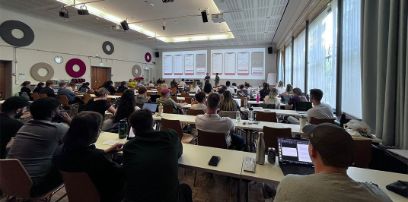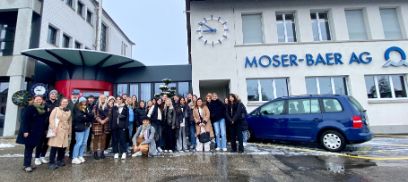Services
We act as a partner for specialists and executives from the worlds of business and public administration, helping them actively shape the digital transformation. We are here for you, from expert support to research projects, student theses and innovative continuing education programmes tailored to your needs.
Research and development
In the area of R&D, the division is focusing on the necessary methodological skills required in response to increasing data availability and analysis options. The aim is to create a toolbox and, in doing so, attain a broad range of methodological knowledge (both qualitative and quantitative) alongside expertise in the areas of project design and applied data science (big data).
Consulting services
Our service offering includes the following areas in particular:
- Counselling/coaching
- Training/continuing education
- Evaluations/surveys
- Audits and reviews
- Presentations
Depending on the project, we work with colleagues from other institutes at Bern University of Applied Sciences and/or with external partners.
Become a live case partner for our students
Would you like answers to exciting questions or tasks in the areas of marketing, communication, global management or intercultural studies for your company? In Live Cases, our students work on solutions to specific issues in your company over the course of a semester.
Please do not hesitate to contact us.
The following entries show examples of the live cases we have already carried out as part of our classes.
Moser-Baer AG - potential entry to Chinese market
Company
Moser-Baer AG is a Swiss company specializing in time systems, offering advanced solutions for precise time synchronization across industries. The company is the official partner of SBB, manufacturing the iconic railway station clocks. In addition to clock production, Moser-Baer is active in medical technology, producing surgical instruments for the healthcare sector.
Case
The live case challenged student teams from BFH and Hochschule München University of Applied Sciences to analyze Moser-Baer’s potential entry into the Chinese market with their MOBATIME product line. Despite China's high demand for precision synchronization systems in sectors like public transport, energy, and manufacturing, companies face access barriers, especially in obtaining tender information. Students were therefore tasked to conduct a Global Strategic Analysis and recommend strategies for overcoming regulatory challenges, navigating local competition, and establishing partnerships to enable successful market entry.
Results
Students proposed diverse expansion strategies for the Chinese market, targeting rail, airports, hotels, and malls. They assessed each sector's potential and challenges, with several groups presenting bold, high-risk, high-reward approaches. Their analyses reflected a strong grasp of China's economic challenges, regional deleveraging, and emerging opportunities, along with insights into competitors and political, cultural, and regulatory hurdles.
Reto Moser, Head of Marketing and Business Unit Manager, Moser-Baer AG
«The collaboration with BFH was a highly positive and enriching experience. While immediate changes were not implemented, the project uncovered innovative perspectives and approaches we hadn't previously considered. The depth of expertise and insight from BFH opened up exciting new opportunities for future improvements, giving us a fresh outlook on tackling industry challenges.»
Rapmed - Global expansion strategy
Company
Rapmed originated as a spin-off from a research initiative within the radiology department of the University Hospital Basel. Rapid training in disease detection is a formidable task, and to address this challenge, Rapmed has introduced an e-learning platform for radiology. This platform supplements theoretical training in imaging with practical cases, ensuring efficient and effective training using real-world data. It aids radiologists in honing their skills to recognize diseases through diagnostic scans. The platform not only facilitates the tracking of radiologists' learning progress but also generates valuable data on disease detection in radiology.
Rapmed's e-learning platform stands out in two key ways: it enables radiologists to teach using their own cases, and it offers an interactive learning experience, allowing teachers to collaboratively solve cases with their peers in live sessions. The primary obstacle faced by Rapmed is the slow adoption of its e-learning platform, leading to an insufficient data pool for the development of AI algorithms.
Rapmed aspires to establish itself as a significant and profitable player in medical imaging, providing unique, fast, and reliable services. The company is keen to explore international expansion opportunities and seeks assistance in formulating an international strategy.
Case
Bachelor students from BFH Business School and HM Munich Business School, specializing in Global Management, conducted a comprehensive global strategic analysis. Each team focused on specific regions to identify high-potential markets, laying the groundwork for an expansion strategy.
Results
Following an intensive semester that involved on-site work during study trips and virtual exchanges, the teams presented their findings and strategic recommendations to Maurice Henkel, CEO of Rapmed.
Maurice Henkel, CEO of Rapmed
«I would like to commend you all on the exceptional work you've done for Rapmed. Your proposals exhibit a thoughtful and product-oriented perspective. Thank you once again for your interest and dedication to Rapmed.»


Bebop Robotics AG - Service robots in the restaurant industry
Company
As the first «Robotic Resource Management Agency», the Bern-based start-up Bebop Robotics AG supports companies in selecting, training and developing the robot best suited to their needs as a new team member. This includes consulting, sales and logistics, commissioning, training, maintenance and, if necessary, integration into existing systems.
Case
How are robots accepted as «service staff» in the restaurant industry? In the Entrepreneurial Marketing module, five student teams investigated how guests, owners and service staff of restaurants react when their food is served by a robot from the start-up Bebop Robotics.
Results
The results of the group work show a mixed picture: restaurant owners recognise the potential value of such robots against the background of the shortage of skilled workers, but the young technology limits the possible applications. Many customers react with curiosity, even if the use of robots noticeably changes the atmosphere in a restaurant. However, as is usual for radical innovations, there are also considerable barriers to acceptance, especially on the part of the service staff. In order to optimally relieve the staff, the robot must be integrated into the team and the processes adapted to the new team member.
Philippe Hegi, Founder and Board of Directors, Bebop Robotics AG
«These have been very exciting and instructive months for us. Thanks to BFH Business School, Bebop Robotics AG has taken another good step forward.»
Meraxis - Lead generation for digital B2B sales channel
Company
Meraxis is one of the leading plastics distributors worldwide. As a full-service provider with a global sales and logistics network, the globally active trading group headquartered in Muri near Bern, Switzerland, provides its customers with targeted support in the strategic procurement of plastics: Meraxis supplies companies from all industrial sectors with polymers and polymer-related products for a wide range of production processes - from the automotive industry to the construction sector and packaging companies.
Case
Meraxis wants to digitally drive market development in three new markets via new channels. To this end, the company wants to use its digital customer portal, which was developed with customers. In addition to information services, this portal also offers the possibility to exchange and place enquiries, offers and orders directly digitally. Meraxis asked itself three key questions:
- How can the landing page for the customer portal be optimised?
- Which channels are suitable for increasing the number of hits on the landing page and generating leads?
- What could a user-friendly app for the customer portal look like?
Results
In the Digital Marketing Strategy module, 22 teams of students from the Bachelor of Business Administration developed recommendations on these three questions. Coupled with input sessions and guest lectures, the student teams were individually coached by the lecturers and accompanied in their development. The results were presented by the students in pitches and written down in concept papers.

Michael Grysczyk, Head of Meraxis Elevator / Digital & Disruptive
«Wir waren positiv überrascht von den kreativen Pitches der Studierenden und freuen uns über die vielen Anregungen, die wir mitnehmen konnten. Einige davon können wir direkt umsetzen.





